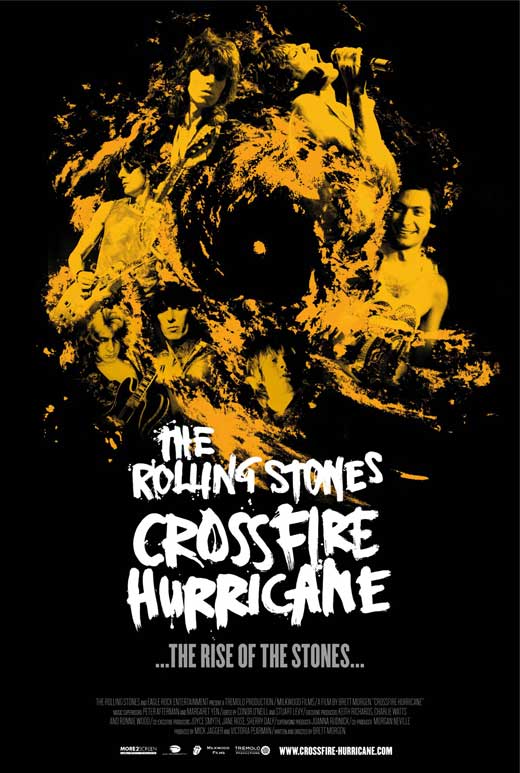Crossfire Hurricane (2012) Director: Brett Morgen
Nick :
It has been the Christmas from hell. A still not recognized allergic reaction I contracted 10 days ago has left me bed ridden. Pablo, our son has now become ill and Astrid has had an awful time just tending to both of us. Festivities have been held off, and essentially a relaxing time with the family after a particularly busy year has descended into a rather depressing quest at recuperation. Amid bouts of extreme irritation, we got round to watching Brett Morgen's Rolling Stones documentary. This film is well made, but one leaves Crossfire Hurricane with a sense of disappointment, not at the movie itself but at the trajectory the bands career has taken. You could argue The Stones were well and truly over once they got to expressing the "it's only rock n roll and I like it" sentiments. Showbiz baby.
Talking heads not seen but heard recount the story. After Keith Richards' Life book and the general view that Richards has been the rebellious heart of the Stones, Crossfire Hurricane challenges this assertion. We get the young Mick Jagger here, the thrill of his raw voice and the juiciest, sexiest lips ever to come out of Dartford. Jagger was the initial spark of excitement that cemented The Stones reputation as dangerous men that you should lock up your daughters from. It was only when the serious drugs kicked in that the outlaw danger, more associated with Richards aligned itself with the Rolling Stones history. Morgen's documentary shows how the Stones upset the middle classes and rioting ensued worldwide, which would lead to the tragic consequences of Altamont. Charlie Watts as usual comes across the best, his dry observations of the mayhem surrounding the band not looking to claim authorship.
The Rolling Stones were a dangerous band, political even. They caused a reaction. The story ends in the 1980's. Why? Simply there is nothing else to tell. Once Mick Taylor left the band and Ron Wood joined, the Stones went from being something potent to mere entertainment. A joke even. A video clip for Jumpin Jack Flash from the 1960's teams with danger and excitement whilst a bright suited Stones clip from the 1980's perfectly illustrates what's been lost. And this brings frustration watching Crossfire Hurricane. You feel that Mick & Keith took their eyes off what this was really about. They didn't ride the storm. They just became the biggest bar band in the world.
Astrid:
It's New Year's Eve and I am writing my blog entry so as to have another write-up published before the end of December 2012. See, we really do try to keep this little movie blog alive! It's just that this year life was much less about lying on the sofa at the end of the day feeling able to watch a film and much more about baby breath any time of the day or night. And then Netflix came to Finland and I have been sneaking in my own movies and TV series while breastfeeding...Anyway, as a resolution for 2013 I promise to TRY my best to have a new review up here every week. (I'm sure Nick will agree to do his best too)
So, on to the Rolling Stones. I was born in the 1980s when dangerous rock'n'roll had turned into stadium rock played by aging stars. That's why it is fascinating and difficult to truly understand what it meant to be in the Rolling Stones in the early 1960s. Or to be a fan of the band for that matter. There was a true division between generations. Crossfire Hurricane visualizes this well. It is smart for the documentary to concentrate on the early decades of the Stones, because there comes a point in their career where danger and rebellion have turned into popular entertainment and business management. That's the point when the only interesting thing left is to speculate what drugs Keith is still on, or how young could their wives possibly become...in other words, nostalgia is all we have left.
Crossfire Hurricane is narrated by the Stones grandpapas as they sound today (but we never see them in the footage as old men) – in 2012. There's a possibility of a new perspective in this old voice/young picture juxtaposition. Sadly, nothing special takes off here though. Maybe even Mick and Keith themselves are beginning to feel too nostalgic about their giant myth of a band. Or maybe they just want to keep the best parts to themselves. In any case, I felt a little disappointed by the documentary.
Lastly, holding a band together is never ever easy and I cannot stop wondering about all the breaking points and friction that these people have somehow survived in order to stay together. I could be cynical and say that the gel holding them together must be money and fame, but I want to believe there's something more precious to it. Some magic.











Comments
Post a Comment